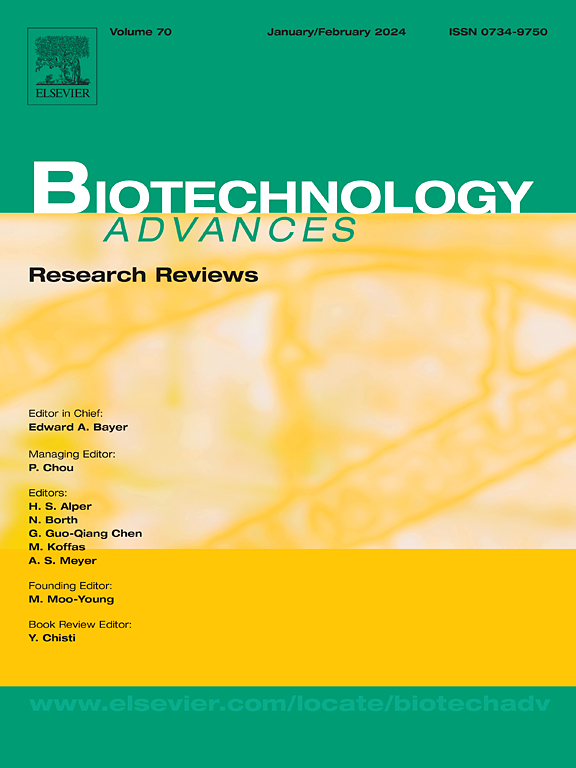Revolutionizing gut health: advances in encapsulation strategies for probiotics and bioactive molecules
IF 12.5
1区 工程技术
Q1 BIOTECHNOLOGY & APPLIED MICROBIOLOGY
引用次数: 0
Abstract
Advancements in biotechnology underscore the critical role of gastrointestinal microbiome in health and disease. Probiotic supplementation offers therapeutic potential, particularly for functional gastrointestinal disorders, which affect over 40 % of the global population and impair quality of life. Despite a rapidly growing probiotics market, many formulations suffer from poor efficacy due to challenges such as gastric survival, temperature sensitivity and poor colonization of the gut lining. Encapsulation technologies have emerged as potential solutions, offering protection for probiotics but introducing complexities related to biopolymer coatings and adhesion efficiency. Moreover, reactive oxygen species (ROS) significantly influence gut health with excess ROS contributing to dysbiosis, intestinal barrier disruption and inflammation. While dietary antioxidants offer some benefits, their rapid clearance and nonspecific biodistribution limit therapeutic efficacy. Encapsulation strategies integrating probiotics with phenolic antioxidants have demonstrated enhanced survival, adhesion, and antioxidant activity, presenting a promising avenue for gut health interventions. This review primarily aims to explore innovative approaches to encapsulated probiotic formulations, emphasizing their potential to address current limitations and improve gut health. Specifically, the review examines key areas of focus including the design and manufacturing of systems incorporating live microorganisms and bioactive molecules; evaluation of their digestion, release and bioactivity; and their in vitro and in vivo efficacy. Finally, regulatory considerations and future research directions, focused on advancing smart encapsulation strategies and novel delivery systems to enhance therapeutic efficacy and address current challenges in gut health interventions are also explored.
革命性的肠道健康:益生菌和生物活性分子包封策略的进展。
生物技术的进步强调了胃肠道微生物群在健康和疾病中的关键作用。益生菌补充剂具有治疗潜力,特别是对于影响全球40% %以上人口并影响生活质量的功能性胃肠道疾病。尽管益生菌市场快速增长,但由于胃存活、温度敏感性和肠道内壁定植不良等挑战,许多配方的疗效不佳。封装技术已成为潜在的解决方案,为益生菌提供保护,但引入了与生物聚合物涂层和粘附效率相关的复杂性。此外,活性氧(ROS)显著影响肠道健康,过量的ROS会导致生态失调、肠道屏障破坏和炎症。虽然膳食抗氧化剂提供了一些好处,但它们的快速清除和非特异性生物分布限制了治疗效果。将益生菌与酚类抗氧化剂整合在一起的封装策略已经显示出增强的存活、粘附和抗氧化活性,为肠道健康干预提供了一条有前途的途径。本综述的主要目的是探索封装益生菌配方的创新方法,强调其解决当前限制和改善肠道健康的潜力。具体而言,该综述审查了重点领域,包括设计和制造含有活微生物和生物活性分子的系统;它们的消化、释放和生物活性评价;以及它们的体内外药效。最后,本文还探讨了监管方面的考虑和未来的研究方向,重点是推进智能封装策略和新型给药系统,以提高治疗效果,解决当前肠道健康干预的挑战。
本文章由计算机程序翻译,如有差异,请以英文原文为准。
求助全文
约1分钟内获得全文
求助全文
来源期刊

Biotechnology advances
工程技术-生物工程与应用微生物
CiteScore
25.50
自引率
2.50%
发文量
167
审稿时长
37 days
期刊介绍:
Biotechnology Advances is a comprehensive review journal that covers all aspects of the multidisciplinary field of biotechnology. The journal focuses on biotechnology principles and their applications in various industries, agriculture, medicine, environmental concerns, and regulatory issues. It publishes authoritative articles that highlight current developments and future trends in the field of biotechnology. The journal invites submissions of manuscripts that are relevant and appropriate. It targets a wide audience, including scientists, engineers, students, instructors, researchers, practitioners, managers, governments, and other stakeholders in the field. Additionally, special issues are published based on selected presentations from recent relevant conferences in collaboration with the organizations hosting those conferences.
 求助内容:
求助内容: 应助结果提醒方式:
应助结果提醒方式:


